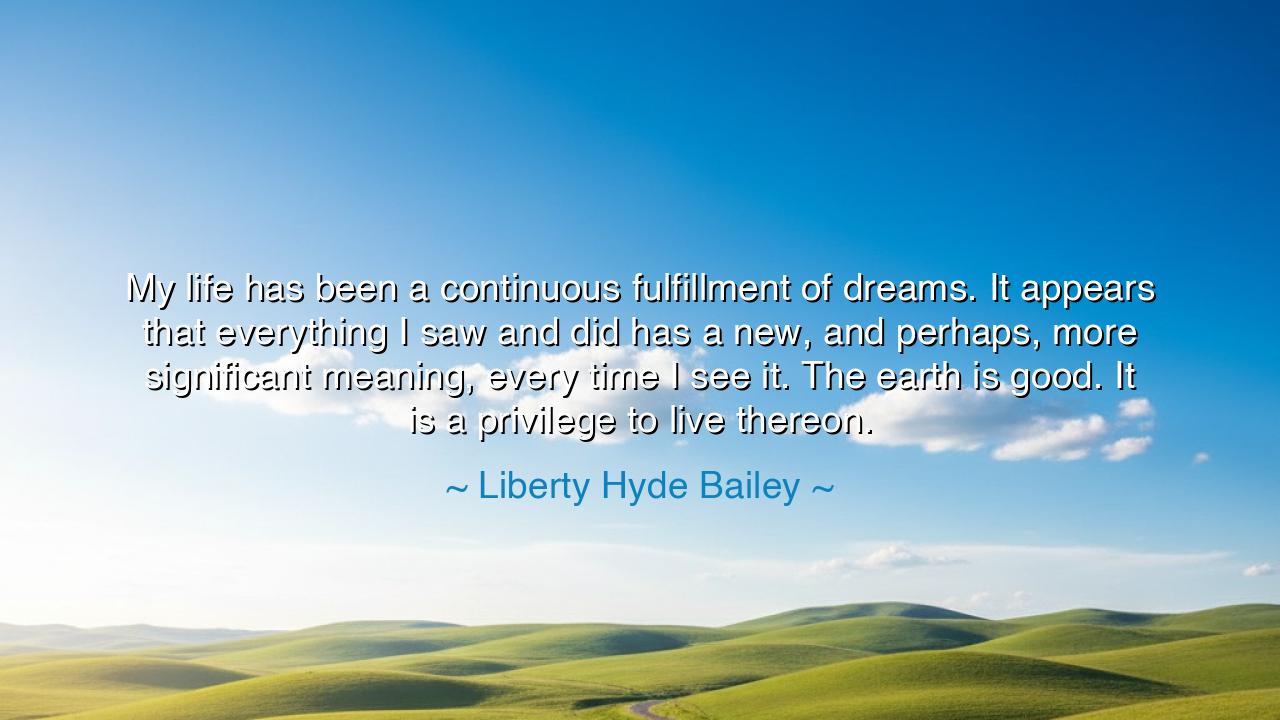
My life has been a continuous fulfillment of dreams. It appears
My life has been a continuous fulfillment of dreams. It appears that everything I saw and did has a new, and perhaps, more significant meaning, every time I see it. The earth is good. It is a privilege to live thereon.






When Liberty Hyde Bailey declared, “My life has been a continuous fulfillment of dreams. It appears that everything I saw and did has a new, and perhaps, more significant meaning, every time I see it. The earth is good. It is a privilege to live thereon,” he was not merely reflecting upon a personal journey — he was uttering a hymn to existence itself. These words are a benediction upon life, an affirmation that the world, for all its sorrow and struggle, remains sacred. Bailey, a botanist, philosopher, and lover of the land, spoke from a soul that had learned to see not with the eyes alone, but with the spirit awakened. His dreams were not made of wealth or fame, but of connection — the union between man and the earth, between observation and wonder.
To understand this quote, one must first understand the man who spoke it. Liberty Hyde Bailey lived during an age of scientific discovery, yet he carried the humility of a farmer. He walked among fields and forests, seeing not just plants and soil, but the living pulse of creation. To him, nature was both teacher and temple. Every seed contained a mystery; every sunrise revealed a new truth. When he said his life was a “continuous fulfillment of dreams,” he was expressing gratitude for the miracle of being — for the ability to witness beauty and to labor among it. His life was not free from toil, but through that toil, he found meaning. He saw the divine not in the heavens, but in the hands that till the earth.
There is an ancient wisdom hidden in his words: that life reveals its meaning only to those who are present enough to see it anew each day. The one who merely looks without reverence sees nothing but repetition; but the one who looks with gratitude discovers revelation upon revelation. Bailey’s insight mirrors the teachings of the sages who said that enlightenment is not found in distant temples but in the patient observation of what already exists. As he says, “everything I saw and did has a new, and perhaps, more significant meaning, every time I see it.” This is the awakening of perception — when the ordinary becomes extraordinary, when the familiar becomes holy.
Consider the story of Henry David Thoreau, who withdrew to Walden Pond to live deliberately, to “see if he could not learn what life had to teach.” Like Bailey, Thoreau believed that the simplest acts — planting a seed, listening to the wind, watching the ripples of a pond — could reveal eternal truths. He too learned that the earth is good, that its goodness is not in what it gives us, but in what it teaches us to see. The soil, the trees, the stars — all are reflections of a greater order, whispering to us the secret that joy is found not in possession, but in perception.
Bailey’s gratitude — “It is a privilege to live thereon” — is the final chord of his message, a sacred bow to creation. It is a reminder that to be alive is not an entitlement but a gift. The ancients spoke of the earth as a mother — giver of sustenance, bearer of life, eternal and patient. In Bailey’s time, as in ours, men were forgetting this truth, turning the land into an object rather than a companion. His words rise as a gentle rebuke and a radiant prayer: to remember that the privilege of life demands reverence, not conquest; stewardship, not exploitation.
In a deeper sense, his reflection is also about the evolution of the soul. He speaks of finding “new and more significant meaning” in what he once thought he already understood — and this is the mark of spiritual maturity. The wise know that life’s meanings do not grow stale; they deepen. Every experience, revisited with wisdom, reveals a hidden layer. The young see the world with curiosity; the old, with gratitude. Bailey’s life, lived close to nature, taught him that existence is not a straight line but a spiral — each return brings us closer to truth.
The lesson, then, is both simple and profound: see the world as Liberty Hyde Bailey saw it — with reverence, with renewal, and with gratitude. Let every moment, no matter how small, be a fulfillment of some quiet dream. Seek not only to understand life, but to honor it. When you walk upon the earth, walk gently, knowing that it bears your ancestors’ dust and your children’s hope. When you look upon the sunrise, look as though it were the first you have ever seen. For indeed, the earth is good, and to live upon it is a privilege beyond measure. Those who remember this truth do not merely exist — they awaken, and in awakening, they make their own lives a continuous fulfillment of dreams.






AAdministratorAdministrator
Welcome, honored guests. Please leave a comment, we will respond soon